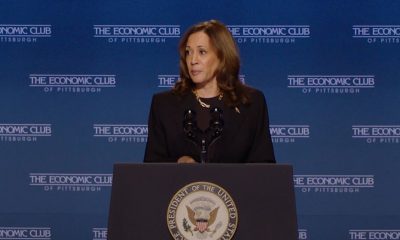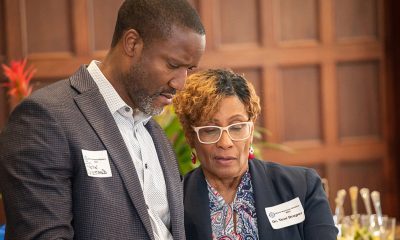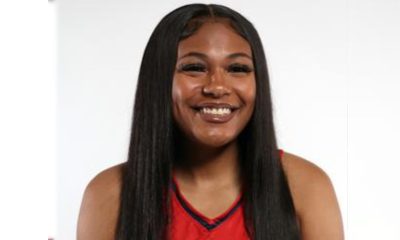Sports
NCAA Hits UNC with 5 Violations in Wake of Academic Scandal

In this March, 2015 file photo, North Carolina head coach Roy Williams bows his head during the second half of an NCAA college basketball game against Virginia in the semifinals of the Atlantic Coast Conference tournament in Greensboro, N.C. The NCAA has charged North Carolina with five violations connected to the school’s long-running academic fraud scandal, including a lack of institutional control for poor oversight of an academic department popular with athletes. (AP Photo/Bob Leverone, File)
AARON BEARD, AP Sports Writer
North Carolina’s long-running academic fraud scandal now includes five NCAA charges, including a lack of institutional control for poor oversight of an academic department popular with athletes and the counselors who advised them.
The school released a 59-page notice of allegations Thursday from the NCAA, which uses the document to specify violations uncovered during an investigation. The charges were more broad-based than focused on individual sports, with the NCAA regarding academic irregularities in the formerly named African and Afro-American (AFAM) Studies department as potential improper benefits by saying athletes received access to courses and other assistance generally unavailable to non-athletes.
No coaches were named in the five allegations, though one dealt specifically with the conduct of a women’s basketball adviser for providing too much help on research papers.
UNC must file a response to the NCAA within 90 days of receiving the notice, which would likely lead to a hearing with the infractions committee followed by a ruling weeks to months later.
“Everybody wants to bring closure to this,” athletic director Bubba Cunningham said Thursday. “It’s not a pleasant chapter in the history of the university.”
The list of charges include counselors providing “special arrangements” to athletes by working with AFAM faculty and staff, such as requesting course offerings or obtaining assignments for athletes, over a roughly nine-year period starting in 2002.
In charging a lack of institutional control, the NCAA said the school didn’t do enough to monitor the AFAM department nor the academic support program for athletes. That allowed for counselors to use the irregular courses to help keep at-risk athletes eligible “particularly in the sports of football, men’s basketball and women’s basketball,” according to the notice.
All five charges are considered potential Level I violations, described by the NCAA as a “severe breach of conduct.” Cunningham said it’s too early to speculate on potential sanctions the school could face.
“Everyone who loves Carolina is truly saddened by these allegations,” Hall of Fame basketball coach Roy Williams said in a statement. “We aspire to and work toward meeting higher standards than the actions that warranted this notice. Our university and numerous outside groups have looked at every aspect of our academic and athletic life. As a result, Carolina has implemented scores of new processes and checks and balances that have undoubtedly made us a better university. Hopefully, we will never again receive such a notice.”
The NCAA reopened its investigation last summer into academic misconduct, an offshoot of a 2010 investigation into the football program that led to sanctions in March 2012. The focus was courses often treated as independent studies that required no class time and one or two research papers, with many operating that way despite being scheduled as lecture classes.
An eight-month investigation conducted by former U.S. Justice Department official Kenneth Wainstein stated that office administrator Deborah Crowder — not a faculty member — typically handed out assignments then high grades after only a scan of the work.
Wainstein’s October report found problems running from 1993 to 2011 and affecting more than 3,100 students, with athletes across numerous sports accounting for roughly half the enrollments in problem courses.
The five charges listed in the NCAA’s notice are:
—There was a lack of institutional control in failing to “sufficiently monitor” the interactions between the AFAM and the academic support departments, noting athletes received “preferential access” to AFAM’s irregular courses.
—Academic counselors “leveraged” relationships from fall 2002 to summer 2011 with AFAM faculty and staff to provide athletes with benefits such as suggesting assignments, turning in papers for them and recommending grades. In addition, 10 athletes exceeded UNC’s 12-hour limit of independent study credits countable toward graduation between fall 2006 and summer 2011 due to misidentified “paper classes.”
—Women’s basketball counselor Jan Boxill provided improper assistance by sometimes adding content to athletes’ papers and recommended a grade for submitted work in at least one case.
—Crowder, one of two AFAM staffers most directly linked to the irregularities, didn’t cooperate with NCAA investigators.
—Former AFAM department chairman Julius Nyang’oro, the other staffer most directly linked to the irregular courses, also declined to cooperate.
Both Crowder, who retired in 2009, and Nyang’oro cooperated with Wainstein’s probe amid the backdrop of a criminal fraud investigation. Boxill resigned in February as a philosophy professor after the school informed her it planned to fire her after the release of Wainstein’s report.
The fraud case has led to several lawsuits from former UNC athletes against the school or NCAA, as well as questions from UNC’s accreditation agency.
The school announced May 22 it had received the NCAA’s notice, but didn’t release the document publicly until Thursday to redact information to comply with privacy laws.
___
Follow Aaron Beard on Twitter at http://www.twitter.com/aaronbeardap
Copyright 2015 The Associated Press. All rights reserved. This material may not be published, broadcast, rewritten or redistributed.
Alameda County
Seth Curry Makes Impressive Debut with the Golden State Warriors
Seth looked comfortable in his new uniform, seamlessly fitting into the Warriors’ offensive and defensive system. He finished the night with an impressive 14 points, becoming one of the team’s top scorers for the game. Seth’s points came in a variety of ways – floaters, spot-up three-pointers, mid-range jumpers, and a handful of aggressive drives that kept the Oklahoma City Thunder defense on its heels.

By Y’Anad Burrell
Tuesday night was anything but ordinary for fans in San Francisco as Seth Curry made his highly anticipated debut as a new member of the Golden State Warriors. Seth didn’t disappoint, delivering a performance that not only showcased his scoring ability but also demonstrated his added value to the team.
At 35, the 12-year NBA veteran on Monday signed a contract to play with the Warriors for the rest of the season.
Seth looked comfortable in his new uniform, seamlessly fitting into the Warriors’ offensive and defensive system. He finished the night with an impressive 14 points, becoming one of the team’s top scorers for the game. Seth’s points came in a variety of ways – floaters, spot-up three-pointers, mid-range jumpers, and a handful of aggressive drives that kept the Oklahoma City Thunder defense on its heels.
One of the most memorable moments of the evening came before Seth even scored his first points. As he checked into the game, the Chase Center erupted into applause, with fans rising to their feet to give the newest Warrior a standing ovation.
The crowd’s reaction was a testament not only to Seth’s reputation as a sharpshooter but also to the excitement he brings to the Warriors. It was clear that fans quickly embraced Seth as one of their own, eager to see what he could bring to the team’s championship aspirations.
Warriors’ superstar Steph Curry – Seth’s brother – did not play due to an injury. One could only imagine what it would be like if the Curry brothers were on the court together. Magic in the making.
Seth’s debut proved to be a turning point for the Warriors. Not only did he contribute on the scoreboard, but he also brought a sense of confidence and composure to the floor.
While their loss last night, OKC 124 – GSW 112, Seth’s impact was a game-changer and there’s more yet to come. Beyond statistics, it was clear that Seth’s presence elevated the team’s performance, giving the Warriors a new force as they look to make a deep playoff run.
Barbara Lee
WNBA’s Golden State Valkyries Kick Off Season with Community Programs in Oakland
“The Golden State Valkyries are more than a team—they’re a movement,” said Oakland Interim-Mayor Kevin Jenkins. “Their touchdown in Oakland marks a new era of opportunity, inspiration, and equity in sports. This partnership reflects our city’s deep commitment to uplifting women, investing in youth, and building a community where every dream has a place to grow. We’re proud to welcome the Valkyries to The Town.”
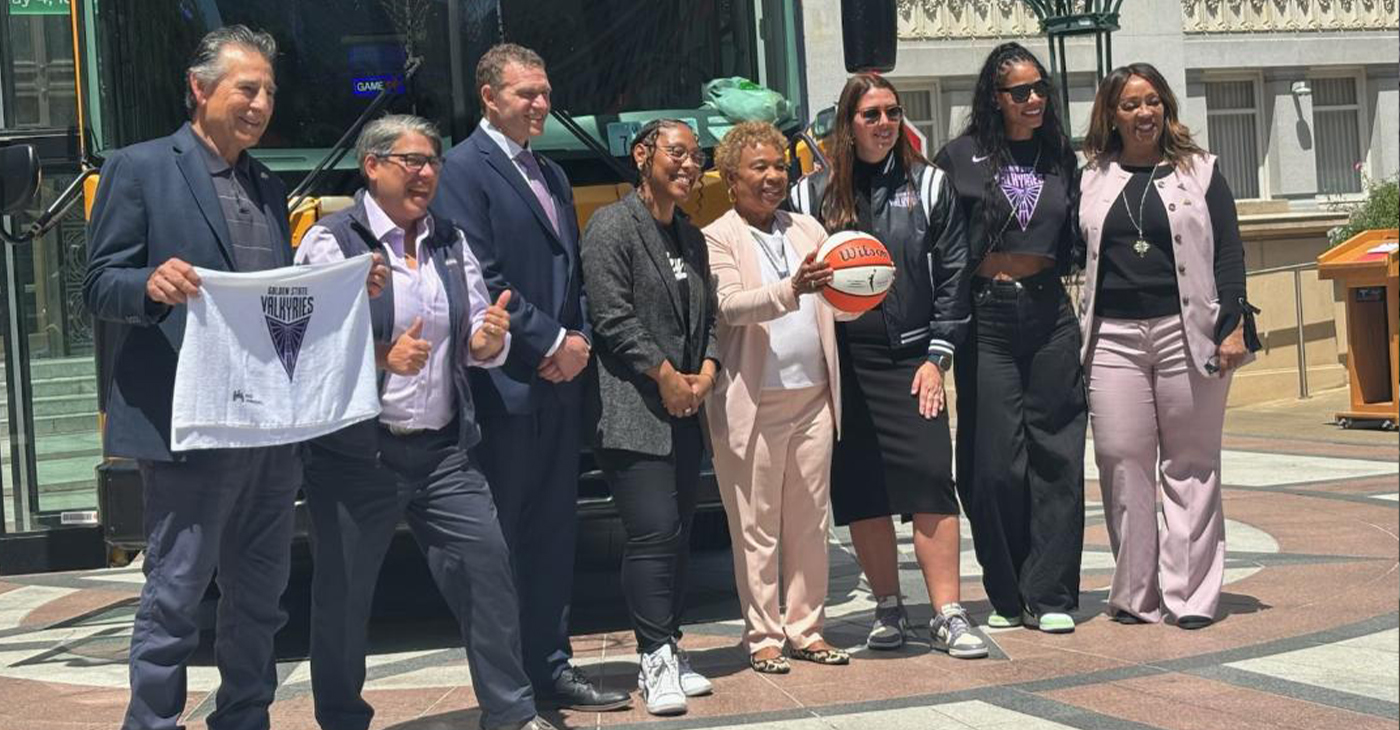
Team installs new nets at playgrounds, holds flag-raisings at City Halls in Oakland and S.F.
Special to The Post
The Golden State Valkyries brought the excitement of their inaugural season to every corner of the Bay Area with a full slate of community celebrations leading up to their historic home-opener against the Los Angeles Sparks at the Chase Center in San Francisco on Friday.
The week featured flag-raising ceremonies at city halls in Oakland and San Francisco, three “Violet Net” installation days at Oakland parks to encourage basketball play, fun “Hoopbus” takeovers at multiple schools presented by Kaiser Permanente, and player appearances.
“The Golden State Valkyries are more than a team—they’re a movement,” said Oakland Interim-Mayor Kevin Jenkins. “Their touchdown in Oakland marks a new era of opportunity, inspiration, and equity in sports. This partnership reflects our city’s deep commitment to uplifting women, investing in youth, and building a community where every dream has a place to grow. We’re proud to welcome the Valkyries to The Town.”
In total, 90 violet nets were installed on 45 basketball courts across 34 public parks throughout Oakland this week. A list of the parks receiving violet nets can be found at Valkyries.com.
About the Golden State Valkyries
The Golden State Valkyries, the WNBA affiliate of the seven-time NBA Champion Golden State Warriors, were announced as the 13th WNBA franchise on Oct. 5, 2023. According to Norse mythology, Valkyries are a host of warrior women who are fearless and unwavering – flying through air and sea alike.
This brand is Golden State’s modern interpretation of Valkyries: strong, bold, and fierce. Tipping off during the 2025 WNBA season, the team is headquartered in Oakland and will play home games at Chase Center in San Francisco. For Golden State Valkyries’ assets, including team logos, visit valkyries.com.
Activism
McClymonds High Names School Gym for Star Graduate, Basketball Legend Bill Russell
William “Bill” Felton Russell was born on Feb. 12, 1934, and died on July 31, 2022. He achieved fame as a U.S. professional basketball player who played center for the Boston Celtics of the National Basketball Association (NBA) from 1956 to 1969. He was the centerpiece of the Celtics dynasty that won 11 NBA championships during his 13-year career.
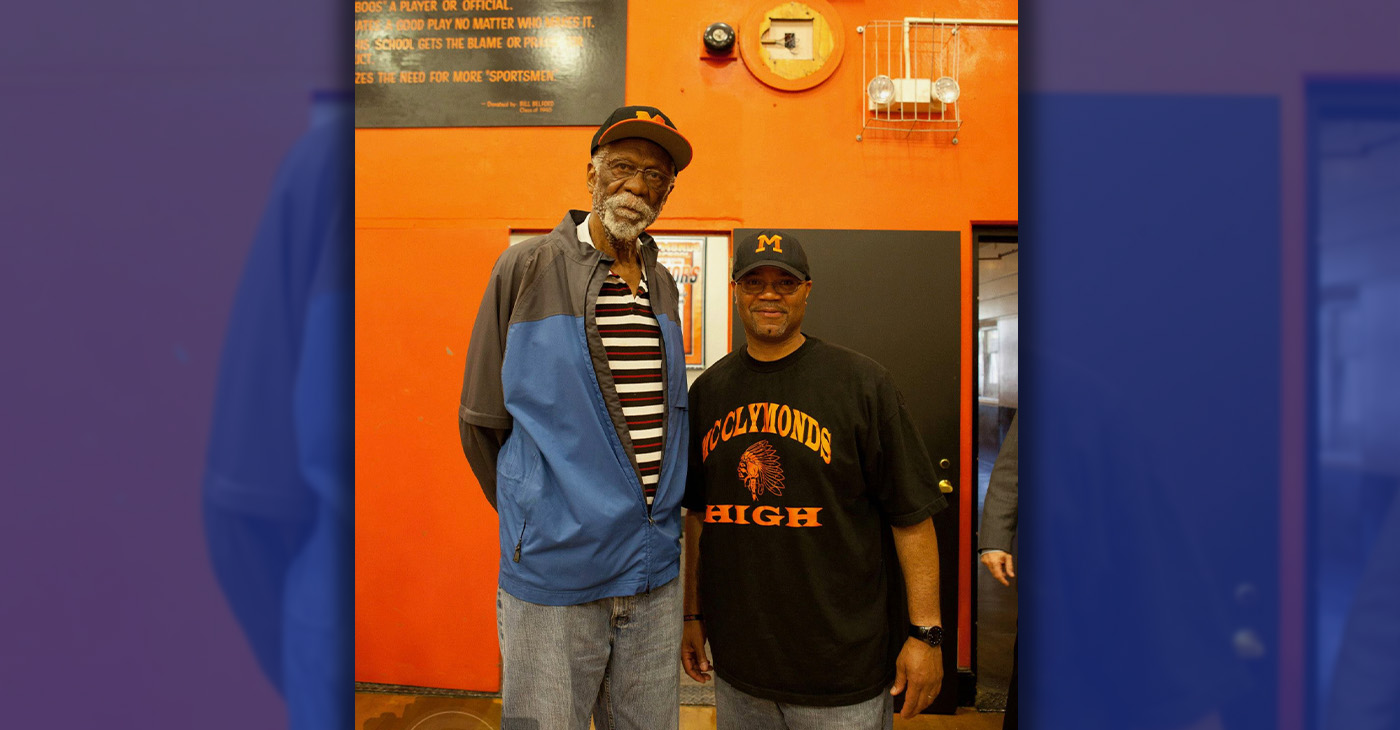
By Ken Epstein
West Oakland’s McClymonds High School, “the School of Champions,” this week named the school’s gymnasium in honor of one of its most famous graduates, basketball legend Bill Russell (class of ’52).
William “Bill” Felton Russell was born on Feb. 12, 1934, and died on July 31, 2022. He achieved fame as a U.S. professional basketball player who played center for the Boston Celtics of the National Basketball Association (NBA) from 1956 to 1969. He was the centerpiece of the Celtics dynasty that won 11 NBA championships during his 13-year career.
Russell is widely known as one of the greatest basketball players of all time. In 2011, he received the Presidential Medal of Freedom, the country’s highest civil honor, from President Barack Obama for Russell’s contributions to basketball and the Civil Rights Movement.
The McClymonds’ naming ceremony was held on Wednesday, the same day as Russell’s birthday. Oakland leader Bill Patterson, a longtime friend of Russell’s, was scheduled to cut the ribbon at the reopening of the gym, which had been closed for several months for renovation. Russell’s daughter Karen was scheduled to attend the ribbon cutting.
Russell’s name and signature are now printed on the gymnasium floor.
Patterson was working at DeFremery Park when he met Russell. “I befriended him as a boy and during his years at University of San Francisco” said Patterson. “We stayed friends for the rest of his life.”
Said McClymonds Principal Darielle Davis, herself a McClymonds graduate, “We are excited to honor Bill Russell for his sports accolades and because he broke color barriers. He is part of our legacy, and legacy is really important at McClymonds.”
Brian McGhee, community schools manager at McClymonds and former football player at UC Berkeley, said that Russell meant a lot to him and others at the school. “He was a beacon of light and hope for West Oakland,” he said. “He did a lot for sports and for civil rights.”
Starting in 2018, Ben “Coach” Tapscott worked with Patterson and other McClymonds grads, community members, and former coaches to encourage the Oakland Board of Education to endorse the naming of the school gym, which finally happened recently.
“We worked hard to make this happen,” said Tapscott. “He’s an important part of McClymond’s history, along with a lot of other famous graduates,” he said.
-

 Bay Area4 weeks ago
Bay Area4 weeks agoPost Salon to Discuss Proposal to Bring Costco to Oakland Community meeting to be held at City Hall, Thursday, Dec. 18
-

 Activism4 weeks ago
Activism4 weeks agoMayor Lee, City Leaders Announce $334 Million Bond Sale for Affordable Housing, Roads, Park Renovations, Libraries and Senior Centers
-

 Activism4 weeks ago
Activism4 weeks agoOakland Post: Week of December 10 – 16, 2025
-

 Activism4 weeks ago
Activism4 weeks agoOakland School Board Grapples with Potential $100 Million Shortfall Next Year
-

 Activism4 weeks ago
Activism4 weeks ago2025 in Review: Seven Questions for Black Women’s Think Tank Founder Kellie Todd Griffin
-

 Arts and Culture4 weeks ago
Arts and Culture4 weeks agoFayeth Gardens Holds 3rd Annual Kwanzaa Celebration at Hayward City Hall on Dec. 28
-

 Advice4 weeks ago
Advice4 weeks agoCOMMENTARY: If You Don’t Want Your ‘Black Card’ Revoked, Watch What You Bring to Holiday Dinners
-

 Activism4 weeks ago
Activism4 weeks agoAnn Lowe: The Quiet Genius of American Couture





